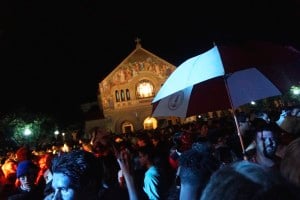After pressures from the University threatened to debilitate or even end Full Moon on the Quad (FMOTQ), the event is back and revamped. This Thursday, expect FMOTQ to bring fewer kisses and more roses, according to the junior class presidents, who plan the event each year.
FMOTQ, a Stanford tradition supposedly dating back to the late 19th century, which has in recent memory involved throngs of students kissing on the quad, faced the possibility of funding cuts from the University last spring due to criticism that the event does not align with the university’s views regarding sexual consent and drinking culture.

A working group of students and faculty, including the junior class presidents, began meeting last spring to plan changes to FMOTQ that would alleviate concerns and ensure continued support by the University while maintaining the spirit of FMOTQ.
“It’s been made super clear to us that changes needed to happen or this tradition was going to go away,” said junior class president Catherine Goetze ’18. “We want to preserve all of the elements of this tradition that students hold so dear, and work with the administration…to find a way that can benefit all parties.”
FMOTQ, which is usually held on the night of the first full moon of October, was postponed until winter quarter to accommodate the working group’s need for student input and to ensure that students – particularly freshmen – are comfortable at Stanford and familiar with a culture of consent before attending the event, according to a release made by the working group at the end of September.
Changes to the event focus on alleviating what Vice Provost of Student Affairs Greg Boardman described in a Spring 2016 email to ASSU executives as “a highly sexualized experience that has alienated as much as it has welcomed,” where “students feel pressured into certain kinds of behavior and to overcome anxiety, drink to excess.”
Kissing will still be present at the event; however, it will not be the event’s focus.
“There was this idea that you run on the quad, there are these pounding lights and music and there are just tables and tables of mouthwash… Basically, ‘prepare yourself for this kissing fest,’ which is definitely how some people will participate on Thursday,” said junior class president Peter Litzow ’18. “But the whole goal of changing this culture was to make sure that everyone had an opportunity to participate.”
This year, students who attend the event will give each other white roses and handwritten cards to express gratitude. According to the junior class presidents, this provides an alternative focus for the event free of the social pressures of mass kissing. The roses, which will circulate among students throughout the night, are an inclusive reimagination of the event’s origins, when a traditional red rose was gifted along with a kiss from a senior man to a freshman woman.
In order to deemphasize the sexual nature of the event’s recent past, Peer Health Educator (PHE) tables will no longer be providing mouthwash, used previously as an alternative to brushing teeth in an attempt to mitigate the spread of germs. Condoms provided by the Sexual Health Peer Resource Center (SHPRC) will be available, but will no longer be the first thing students see upon entering the event.
The LED wall and DJs of years past will be replaced by student bands, including Real People Music, in an attempt to better represent student culture. The Stanford Band was originally scheduled to play at the event but is unable to perform due to its suspension in December.
These changes will help the event move away from the club atmosphere of recent years toward a more traditionally-Stanford vibe, according to the junior class presidents. The slogan of the event? “Keep Stanford Weird.”
“Every step along the way, we have always asked ourselves: is this an event we’d want to attend?” Litzow said. “And throughout, it has been.”
Despite the working group’s focus on maintaining the spirit of the tradition, some are concerned that the changes reflected pressures from the University more than any other considerations.
“For me, it was kind of obvious how much the junior class presidents were being forced into a position to make a lot of changes to the event,” said Austin Flick ’18, who represented Stanford’s co-op community in an advisory committee that consulted with the working group this fall. “The main focus by the time I got there was mostly, how can they keep the event happening this year, and how can they make sure that it won’t be canceled for next year’s junior class presidents?”
The junior class presidents say they pushed back against changes that didn’t match their vision for FMOTQ, and that the event is the result of a collaboration between students and administration.
But after other University interventions into student life, including instating a new alcohol policy and suspending the band, some feel there is a strong possibility of FMOTQ eventually being canceled, too.
“Given the current state of the relationship between the administration and the students, I would be under the impression that we’re moving toward not having University-sponsored Full Moon,” Flick said.
If the efforts to change the event aren’t enough, the University may strip funding in the future. But this isn’t the first time FMOTQ has faced University intervention. The event was discontinued in 1961 due to pranks by a group of students and did not reappear until 1976. Last year’s junior class presidents faced pressures to make changes to the event as well, according to junior class president Ibrahim Bharmal ’18.
The outcome of this year’s FMOTQ is crucial in determining whether the University will allow the event to continue, according to a list of guidelines and frequently asked questions sent to Resident Assistants (RAs) of freshman dorms the week of the event. In the guidelines, freshmen are urged to “keep this in mind when preparing and attending the event.”
The junior class presidents hope that students embrace the newest iteration of FMOTQ as another natural progression in the evolution of the beloved tradition.
“Full Moon changes every single year,” said junior class president Gabriela Nagle Alverio ‘18. “[As for] the fear that it won’t be what we’ve had in the past – yeah, it won’t… It might even be better.”
FMOTQ will take place at the Main Quad on Thursday, beginning at 11:30 p.m.
Contact Zoe Sayler at zoeneile ‘at’ stanford.edu.
